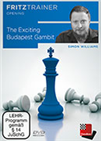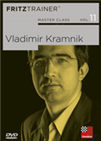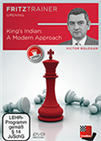Dealing with a pervasive issue
For decades, the problem regarding ‘grandmaster draws’ has been a frequent talking point among chess fans and organizers. Unlike other sports, chess allows for players to agree to a draw, be it explicitly or implicitly — by entering a forced line that leads to a threefold repetition or quickly exchanging down into a completely equal endgame. Many workarounds have been proposed, but at the end of the day, chess fans have become aware of how fighting a player actually is — i.e. how willing he or she is to step away from the safe routes that tend to lead to a peaceful outcome.
 The Budapest Gambit is an exciting and fun way to play against 1.d4 and 2.c4 - replying with 1...Nf6 and 2...e5. In this video you will learn how to pose problems for White with this fascinating opening.
The Budapest Gambit is an exciting and fun way to play against 1.d4 and 2.c4 - replying with 1...Nf6 and 2...e5. In this video you will learn how to pose problems for White with this fascinating opening.While official FIDE tournaments, like the ones in the World Championship cycle, need to create well-defined regulations beforehand to maintain their credibility — in terms of qualifying methods and specific event rules — many of the strongest tournaments in the world are still being organized privately. Many factors are in play for the organizers to pick which players to invite, but usually they attempt to increase the value for the audience by inviting players who have proven they will not use the aforementioned ultra-cautious techniques.
But how to really characterize a ‘fighting player’? We all have a feeling for what that might mean, with some giving more weight to the players’ tendency to create havoc on the board early on, and others deeming more important how far a player is willing to go in a close-to-equal ending.
 Luckily, someone took the job to make a serious proposal addressing this issue. It was none other than Australian GM David Smerdon, who last week published a quantitative method to measure top players’ combativeness using what he dubbed as the Fighting Chess Index.
Luckily, someone took the job to make a serious proposal addressing this issue. It was none other than Australian GM David Smerdon, who last week published a quantitative method to measure top players’ combativeness using what he dubbed as the Fighting Chess Index.
Smerdon is not only a grandmaster but also an economist. He has played for the Australian team in the Chess Olympiad since 2004, and is now a lecturer at the University of Queensland, with areas of research in Applied Economics; Economic Development and Growth; Experimental, Behavioural, and Evolutionary Methods. He is also the author of the highly praised book The Complete Chess Swindler (New in Chess, 2020) — in December last year, Johannes Fischer reviewed the book.
Kramnik tops the list
So what is this index all about? Smerdon wrote an extensive article introducing the FCI and the basic methodology he used to create it. He also provided current rankings, FAQs, and a technical note with details for replication. Here we present a few excerpts:
The FCI is a score out of 100, where a higher score means the player is more ‘fighting’.
- First, I cleaned the database as best I could to merge names for the same player, and remove simul, Chess960 and consultation games, etc.
- Second, I calculated the percentage of draws, ‘short’ draws and short draws with White, as well as the average length of draws, for each player.
- Third, I ran a principal component analysis that, in simplistic terms, combines all of the metrics above, weights them in such a way as to avoid double counting, and extracts one number to represent the ‘hidden concept’ that these measures might explain — in this case, ‘fighting chess’.
- Finally, I adjusted the scores such that players who more often play players around their own strength aren’t punished for scoring more draws than similar players who play games with bigger rating differences, such as in large open tournaments.
Smerdon then presented two lists, one for the top 50 players in the world (according to their average ratings in the 2015-2020 period) and one for the top 100 players in the world. You can see the full lists in the article mentioned above. Below we present the top 10 and bottom 10 from the top 50 list:
Rank FCI Name
 This DVD allows you to learn from the example of one of the best players in the history of chess and from the explanations of the authors (Pelletier, Marin, Müller and Reeh) how to successfully organise your games strategically, consequently how to keep y
This DVD allows you to learn from the example of one of the best players in the history of chess and from the explanations of the authors (Pelletier, Marin, Müller and Reeh) how to successfully organise your games strategically, consequently how to keep y
- 80.1 Kramnik, V
- 79.3 Le, Q
- 78.9 Navara, D
- 78.4 Caruana, F
- 77.3 Artemiev, V
- 77.0 Eljanov, P
- 76.9 Naiditsch, A
- 76.8 Duda, J
- 76.5 Carlsen, M
- 76.0 Inarkiev, E
....
- 60.7 Vitiugov, N
- 59.5 Almasi, Z
- 59.0 Kryvoruchko, Y
- 58.8 Vallejo Pons, F
- 58.7 Svidler, P
- 58.2 Jakovenko, D
- 57.9 Anand, V
- 57.9 Tomashevsky, E
- 57.6 Kasimdzhanov, R
- 51.2 Radjabov, T
Do check out Smerdon’s comments to the results published on his website. Naturally, the metrics and weights used in the system can be tweaked here and there. Regarding this subject, the author explained:
I also reran the index under various different assumptions to see if the rankings significantly changed; on the contrary, the FCI is remarkably robust. Players who have very similar scores might swap their rankings depending on the assumptions, but someone ranked 1st will always come out as significantly more fighting than someone ranked 20th no matter which version we use.
Will there come a time when organizers will explicitly use this metric to justify why they invited a lower-rated player to a top event? We are sure chess fans around the world would gladly welcome such an initiative.
For some players, the FCI came out just a bit too late.
 Bologan: "If you study this DVD carefully and solve the interactive exercises you will also enrich your chess vocabulary, your King's Indian vocabulary, build up confidence in the King's Indian and your chess and win more games."
Bologan: "If you study this DVD carefully and solve the interactive exercises you will also enrich your chess vocabulary, your King's Indian vocabulary, build up confidence in the King's Indian and your chess and win more games."
Links


















 Luckily, someone took the job to make a serious proposal addressing this issue. It was none other than Australian GM David Smerdon, who last week published a quantitative method to measure top players’ combativeness using what he dubbed as the Fighting Chess Index.
Luckily, someone took the job to make a serious proposal addressing this issue. It was none other than Australian GM David Smerdon, who last week published a quantitative method to measure top players’ combativeness using what he dubbed as the Fighting Chess Index.




